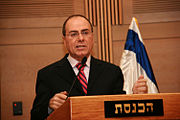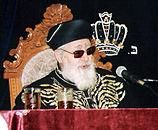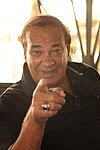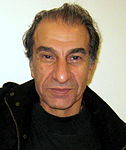Shas is a Haredi religious political party in Israel. Founded in 1984 under the leadership of Rabbi Ovadia Yosef, a former Israeli Sephardi chief rabbi, who remained its spiritual leader until his death in October 2013, it primarily represents the interests of Sephardic and Mizrahi Haredi Jews.

Ovadia Yosef was an Iraqi-born Talmudic scholar, a posek, the Sephardi Chief Rabbi of Israel from 1973 to 1983, and a founder and long-time spiritual leader of Israel's ultra-Orthodox Shas party. Yosef's responsa were highly regarded within Haredi circles, particularly among Mizrahi communities, among whom he was regarded as "the most important living halakhic authority".
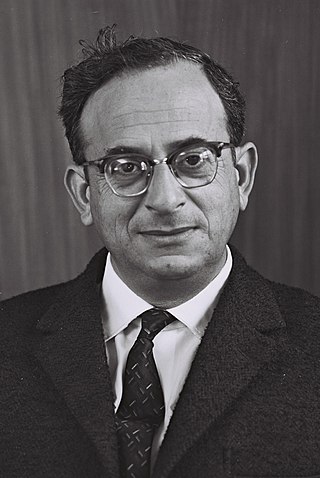
Yitzhak Rachamim Navon was an Israeli politician, diplomat, playwright, and author. He served as the fifth President of Israel between 1978 and 1983 as a member of the centre-left Alignment party. He was the first Israeli president born in Jerusalem and the first Sephardi Jew to serve in that office.

Mordechai Tzemach Eliyahu, was an Israeli rabbi, posek, and spiritual leader.
Zvhil is the name of a Hasidic dynasty, with adherents today in Jerusalem, Boston, and New York.

Hardal usually refers to the portion of the Religious Zionist Jewish community in Israel which inclines significantly toward Haredi ideology. In their approach to the State of Israel, though, they are very much Zionist, and believe that Israel is Atchalta De'Geula.
The Israeli Ceremonial Protocol does not define an order of precedence. It does define, however, the group of officials that are to attend ceremonial events. This group consists of:
- The President
- The Prime Minister
- The Alternate Prime Minister (vacant)
- The Speaker of the Knesset
- The President of the Supreme Court
- The Chief Rabbis
- Former Presidents
- Ministers of the Government
- The Leader of the Opposition, Chair of the Coalition
- Justices of the Supreme Court of Israel, President of the National Labor Court
- The Attorney General of Israel
- The State Comptroller
- The Governor of the Bank of Israel
- Chairman of the Executive of the World Zionist Organization
- Chairman of the Jewish Agency for Israel
- The Dean of the Diplomatic corps
- The Chief of Staff of the Israeli Defense Forces
- The Police Commissioner
- Members of the Knesset
- Commander of the Prison Service, Commissioner of the Israel Fire and Rescue Services, Director of the Shin Bet, Director of the Mossad, Head of the Atomic Energy Commission
- Former Prime Ministers, Speakers of Knesset, Chief Rabbis, Presidents of the Supreme Court and widows of former Presidents
- Heads of Diplomatic Missions
- Representatives of the minority religious communities in Israel – Christians, Muslims, Druze, and Circassians
- Military Secretary to the Prime Minister, Director-general of the Prime Minister's Office, Director-general of the Knesset
- Mayor of Jerusalem, Chairman of the Federation of Local Authorities, and Head of the hosting Local Government
- Cabinet Secretary, Knesset Secretary
- Members of the Executive of the World Zionist Organization, including the Chairman of Keren Hayesod
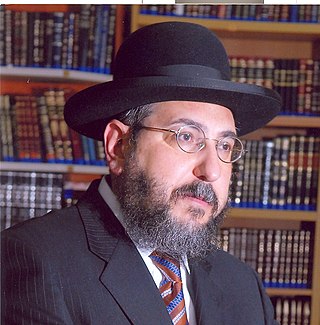
Rabbi Haim (Emile) Amsalem is an Israeli politician and a former member of the Knesset. Elected to the Knesset in 2006 as a representative of Shas, he left the party in 2011 and established Am Shalem. The new party contested the 2013 Knesset elections but failed to win a seat.
Events in the year 2012 in Israel.
Baruch Ben Haim was a Sephardi Hakham who served as Chief Rabbi of the Syrian Jewish community in Brooklyn, New York for 55 years. He taught at Magen David Yeshiva and established the Shaare Zion Torah Center at Congregation Shaare Zion. He was a protege of Rabbi Ezra Attiya, rosh yeshiva of Porat Yosef Yeshiva, who trained and dispatched students to leadership positions in Sephardi communities around the world.
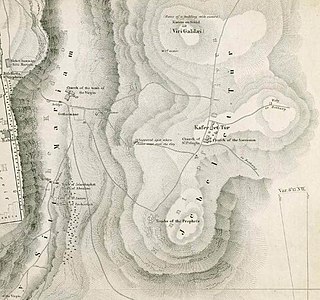
The Jewish Cemetery on the Mount of Olives is the oldest and most important Jewish cemetery in Jerusalem. The Mount of Olives has been a traditional Hebrew/Jewish burial location since antiquity, and the main present-day cemetery portion is approximately five centuries old, having been first leased from the Jerusalem Islamic Waqf in the sixteenth century. The cemetery contains anywhere between 70,000 and 150,000 tombs, including the tombs of famous figures in early modern Jewish history. It is considered to be the largest and holiest historical Jewish cemetery on earth.
Ashkenazi Jews in Israel refers to immigrants and descendants of Ashkenazi Jews, who now reside within the state of Israel, in the modern sense also referring to Israeli Jewish adherents of the Ashkenazi Jewish tradition. As of 2013, they number 2.8 million and constitute one of the largest Jewish ethnic divisions in Israel, in line with Mizrahi and Sephardi Jews. Ashkenazim, excluding those who migrated from the former USSR, are estimated to be 31.8% of the Israeli population in 2018.

Kurds in Israel refers to people of Kurdish origin residing in Israel. The Kurdish population in Israel is small and is mainly composed of individuals and families, who fled Iraq and Turkey during the Iraqi–Kurdish and the Kurdish–Turkish conflicts during the 20th century, as well as temporal residents arriving in Israel for medical care.
The April 2019 Israeli legislative election was held using closed list proportional representation. Each party presented a list of candidates to the Central Elections Committee prior to the election.



